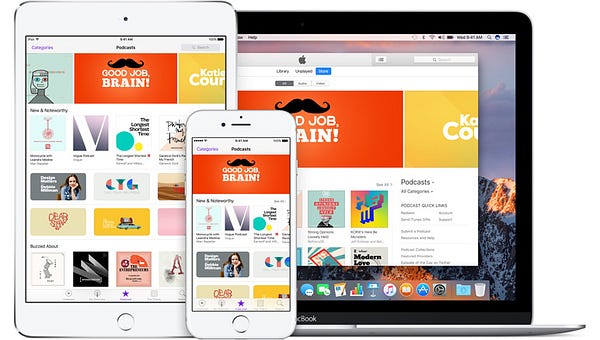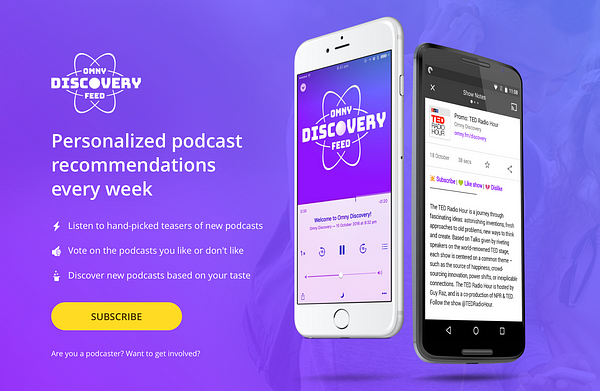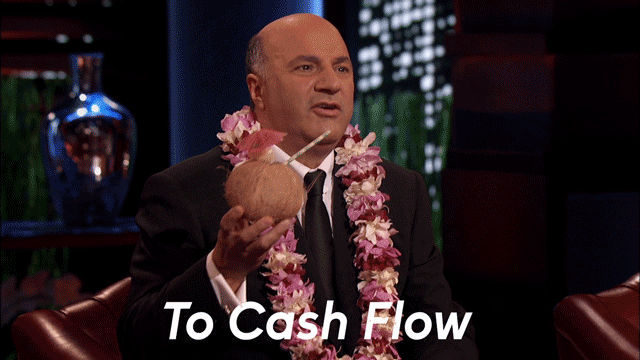- Details
- Category: What’s New
- Published on Friday, 23 December 2016 12:00
What a year! Just this week Apple announced that Podcasts were downloaded or streamed more than 10 billion times in 2016!
Here at Omny Studio, Apple Podcasts accounts for 52% of download/streams on our hosting platform. Therefore, using some napkin maths — the total amount of Podcast listens in the world across all platforms in 2016 is around 19 billion. Continuing the rudimentary calculations, if everyone monetised on a very low CPM (advertising revenue per 1,000 listens) of just $5 — Podcasting is a $9.5b dollar industry. Now, of course we don’t host and monetise everyone (I wish!) so I appreciate the far-fetchiness of the above — but after working in audio for over a decade I can honestly say 2016 was a huge year for the industry.

Below is my year in review. Based on spending a lot of time reading, working, analysing, strategising and fraternising in the podcasting space — here are some of the biggest events that (I believe) shaped the industry in 2016. Hopefully my boss Sharon will now appreciate that all my time scrolling through industry blogs was worth it!
Innovations of the year
2016 saw some nice improvements in the way podcasts are made, published and shared.
The biggest innovations arose from social sharing of audio
- This American Life birthed a product called Shortcuts. It takes the transcription of an episode, couples it with some automated kinetic text video generation and the end result is a beautiful, shareable piece of content.
.@imontheradio talks to a Marine who changed how he talked to people about his time in the military (Shortcut clip) https://t.co/NlxsPs1Qcjpic.twitter.com/nnzkUczih5
— This American Life (@ThisAmerLife) December 9, 2016
- Similarly, we at Omny Studio created “Visualised Audio” i.e. automatically generated waveform videos with customisable colours, artwork and text for Facebook and Twitter.
See more on Omny’s visualised audio (link)
- This joins other social sharing tools created in 2016 including WNYC’s open-sourced Audiograms, Audiosear.ch’s Clipmaker, Audible’s clipping tool for books and pioneer of the space (and now probably hating being in a sea of competition) Clammr.
Other noteworthy 2016 inventions
- Bumpers, an app for makers secured $1m in seed funding. This lets you record into your phone, perform some AI assisted editing, add some nice sounding transitions and share your creation to a podcast or elsewhere.
- Zencastr moved out of beta and allowed podcasters to easily remotely record guests and automatically stitch the two microphones together in one synced high-quality file. Thereby finally surpassing my guide to do the same thing using Skype and a Mac.
- With the advances in social sharing, speech-to-text was likewise being improved and automated, so that episode transcriptions become a much easier thing to create (and podcasts become a hell of a lot more searchable). Big movers in the space I noticed in 2016 are audiosear.chand for the developers a new product that uses a mix of automatic and human-assisted transcription: Scale API.
Which leads perfectly into…
Introducing Audio + The Connected Home
The connected home (i.e. Kubrick/Black Mirror-esque talking to your house and it replies with the news and weather) is coming in a big way and 2016 saw some marked developments in making this dream a reality.

Amazon leads the charge
First they had Audible — a subscription service that allows you to listen to a catalogue of read aloud books. This year, they created Channels — an interesting series of commissioned short-form audio-on-demand pieces. It sits behind a paywall that you can either pay separately for, or have included with Amazon Prime. Bloomberg reported, almost incredulously, that now “Amazon wants people to pay for podcasts”.
Although the Audible’s SVP of Original Content, Eric Nuzum does not want you to call his creations ‘podcasts’ at all. Think more: a short-form spoken-word revolution.
Finally, Amazon has built their own hardware to power this whole experience. Enter: Alexa. It’s a little AI powered assistant that reportedly people who have one talk to three times a day or more. So here we have a billion(s) dollar company creating the content, hardware and a large consumer base to make audio-on-demand really sing.
Publishers hire for audio-on-demand
If you need more proof that this movement is firmly in the “one to watch” category — take a look at the publishers that hired staff specifically for the audio-on-demand space in 2016.
Don’t forget Apple and Google!
This year, Apple put podcasts in Apple TV (arguably the inclusion of Siri in Apple TV is their first steps into the connected home) and launched Spoken Editions where articles from print are read aloud in iTunes. And then, despite removing headphone jacks, the iPhone 7 bought with it Airpods.

One of my favourite reads came from Slate, who argued these little wireless headphones are actually the world’s first ear computer. Take all the possibilities of connected home (and it’s associated audio content) and make it mobile? Now we’re talking.
Google was a bit uninspiring in 2016 — at first we thought they were going to do something huge with podcasts (when they announced they’d be bringing them to the Google Play Music) but it ended up being a bit of a fizzer. But Google did release their hardware to take on Alexa — and now we can plug into “Google Home”.
I think Cortana exists somewhere in the connected home space as well but, you know… who cares?
The connected car stalls a little
2015 saw a lot of movement around the connected car. Two victors emerged — Apple’s Carplay and Google’s Android Auto are destined to control the dashboards of the future. In 2016, the automobile tech industry went a little quieter — nothing much to see here besides a few “car modes” of certain apps.
A couple of noteable points though — I caught an Uber (that’s not the noteable part) and my driver admitted to seeing “Podcasts” on his dashboard but had no idea how to start listening to one. I noticed that there was no way to browse the store or even begin listening to shows without having subscribed to something on your phone first. I bought this up with an Apple employee at the LA Podcast Festival and he mentioned that “yes, that UI does need a bit of work”.

Finally, one independant company Otto integrated with Uber to “soundtrack your ride”. Basically, Uber knows how long your trip is going to be, Otto takes this information and builds a personalised audio playlist for that anticipated journey time.
Blunders of the Year
It wasn’t all beer and skittles in the industry. There were a few “oops” moments. Here’s my Top 3.
- NPR told its member stations to not talk about its highly successful NPR One app or tell listeners where to get podcasts of their favourite NPR shows on-air. There were a couple of business arguments lobbed back in defence but from an outside observer’s point of view, it looked like the old is not quite keeping up with the realities of the new.
- Analytics company Podtrac admirably tried to bring some coherant measurement and messaging to the industry by charting the top performing podcasts in their Podtrac rankings. People found issue with a couple of things — first, allegedly they forgot to ask everyone if they would like their previously private listener numbers released. Secondly, there was a perceived conflict of interest as they simultaneously announced their sister advertising company, Authentic.
- The realities of business seemed to bite industry content juggernauts Gimlet a little in 2016. The big news story was them dropping the Mystery Show and it’s host Starlee Kine from the network. Gimlet is well known and well respected for it’s high quality, highly produced podcasts. However, as those who work in content know — that means they’re also highly expensive to make. So what happens when you’ve taken on a lot of investment and there’s a certain ‘upper level’ to how much you can make per listener and the costs start to overtake the profit? Well — you get, as always, a very honest recorded conversation from the founders in one of their podcasts — saying that things are pretty tenuous right now. I wish them nothing but the best because they have done so much for the industry.
“I want to listen to Podcasts, where do I begin?”

Awareness of Podcasting in 2016 was reported to be at an all-time high of 55%. So, 1 in 2 people know what a Podcast is, but the actual number who know how to start listening to one (or even which ones to listen to) is much smaller than that. The gatekeeper of discovery has traditionally been Apple — with their Podcasts storefront available on desktop and mobile. However, this year a bunch of other companies tackled the problem of discovery with success.

- PRX spin-off company Radio Public released their app — it starts with an automated podcast librarian serving you recommendations. This chat interface makes me think — “aaah connected home!” (as speech can be turned into text, run through a chatbot, and have its response turned back to speech by the AI assistant).
- New company 60db brings “short form personalised stories to iPhone and soon, Echo”. These guys are of note because of their connections with publishers and some interesting exclusive content for the app.
- NPR One added a new “explore” tab to their popular app.

To tackle the discovery problem, we at Omny Studio released our Podcast Discovery Feed. It’s like Spotify Discover Weekly but for podcasts! It’s one RSS feed (that you can subscribe to in any podcasting app) that learns what you like and dislike to deliver a fresh list of new and popular shows each week. Give it a try!
Data, Data, Data…
A major flavour of 2016 was a certain uneasiness in the “stratification” of different layers of professionalism in the podcast industry. In other words, everyone can podcast, but it’s the big shows with big audiences, attracting big advertising dollars that were driving the industry and it’s technical development. This all crystalised in a May New York Times article that queried Apple’s role in the ecosystem. Some big questions seem to be arising as flimsy podcast stats competed for the same advertising dollar as highly measurable video and digital impressions.

The questions were:
- Should Apple share data that it knows? (i.e. about subscriber numbers or potentially listener behaviour it could gather through its apps)
- If not — is there another way to get this data?
- What language should advertisers, publishers and content makers all speak? (i.e. a “download” is not necessarily a “listen”)
- Who is going to be in charge of this whole emerging marketplace?
2016 went a long way to answering those questions. Turns out the answer is:
Although Apple did launch Podcasts Connect, a podcast management dashboard for the iTunes store — as perhaps a precursor to sharing more information with makers? And therefore making it easier to convert stats into advertising dollars.
Show me the money!
So where do we end up at the end of 2016? Well, the best model for making money off your podcasts is still having a show sponsorship. Now this sponsorship can either come from a sales team in a podcast network you are a part of, a third party podcast ad company or a direct sale you make yourself. If noone cares enough about your show, we even saw this year the launch of Podwave, the world’s first programatic exchange that was built specifically for podcasts.

Still, the value of a podcast as an advertising product has flip-flopped more than an Olympic table tennis match in 2016.
The arguments for:
- People are listening to podcasts more than ever.
- The hosts are trusted personalities, intimately talking in their audiences’ ears and therefore a terrific candidate for influencer marketing.
- A podcast can find and talk to a niche audience like very few other digital products can.
- It’s effective.
The arguments against:
- Your stats are overinflated — how many of your 1 million were automatic downloads that sat unlistened to on peoples devices?
- That 30 second skip button must be mighty tempting to ad-listeners.
- There’s not a heap of advertisers competing with me here, so take my tiny low dollar amount or I’ll go elsewhere.
- At least I get TV and radio.
So what does all this mean for 2017? We’ll have to find out but unless podcasts continue to grow in dollar value as an advertising-lead industry, we’re probably going to see the industry as a whole slow down. In the meantime, our job is to drive listeners, quality products and meaningful measurement into the space.
Oh, and there’s always other ways to make money from podcasts!
Best Article of the Year Award
Ken Doctor’s amazing 5-part deep dive into the podcasting industry for Nieman Lab. An incredible snapshot of the industry right now.

What to expect in 2017
I was asked to contribute to RAIN News’ industry predictions for 2017. A lot of this list is my 2016 list that didn’t quite hapeen last year, but anyway — here’s what I think we may see in the year to come:
- Apple provides more data back to content makers.
- Spotify breaks through its first “Spotify signed” artist.
- Pandora brings a good music/content mix experience to mobile.
- Google does… something with podcasts (search, AI, ads?)
- Amazon continues to lead the charge into connected home with audio hardware and creating short-form audio pieces for inside it.
- Stitcher (now owned by very old but very innovative radio company Scripps) build a paywall/hosting solution.
- Tech-forward hosting providers consolidate as the land grab for quality content producers slows down.
- Tidal/8-tracks/Soundcloud/Deezer/Twitter search for a business model that makes sense.
- Consumer experiences get better but no-one wants to download a new app.
- CPMs for programatic ads in podcasts are still really low.
- Audio-on-demand grows.
- Radio is still listened to.
- TV is still watched.

Happy New Year!
I’d love to hear from you — This email address is being protected from spambots. You need JavaScript enabled to view it.” ‘ + path + ”’ + prefix + ‘:’ + addy1554 + ” target=”_blank”>’+addy_text1554+”;
//–> and of course check out Omny Studio if you have a Podcast!